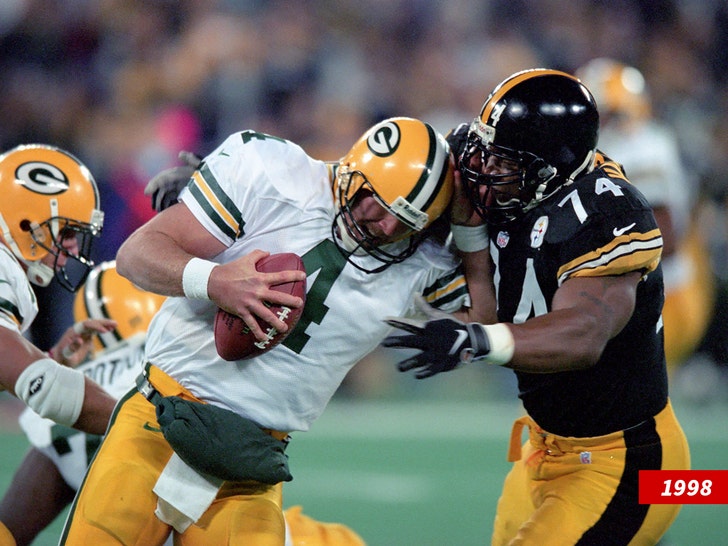
USA Today via Reuters
Syndication: USA TODAY, Brett Favre has said he didn t know the money he received came from welfare funds. Xxx Sline Brett Favre 081020 Dcb Jpg, 28.10.2021 13:56:50, 17044745, Brett Favre, USATNSYNDICATION, USA TODAY PUBLICATIONxINxGERxSUIxAUTxONLY Copyright: xShelleyxMaysx 17044745

USA Today via Reuters
Syndication: USA TODAY, Brett Favre has said he didn t know the money he received came from welfare funds. Xxx Sline Brett Favre 081020 Dcb Jpg, 28.10.2021 13:56:50, 17044745, Brett Favre, USATNSYNDICATION, USA TODAY PUBLICATIONxINxGERxSUIxAUTxONLY Copyright: xShelleyxMaysx 17044745
When you think of Brett Favre, you think of toughness, grind, invincibility. This NFL legend spent 20 seasons writing his name into the history books of the NFL, throwing 508 touchdown passes and leading the Green Bay Packers to a Super Bowl XXXI win. Having played an Ironman (he made 297 starts straight) Favre was a tough-as-nails guy who loved the game.
But for all the honor that accompanied his Hall of Fame career, what it caused in his body (and brain) is a reality about the game he played. Favre’s era was physical, in which players often played while in pain, and took risks with their long-term health, in his own words “It’s the ones that seem minor that do the damage.”
Favre’s story highlights a sad fact of football history: that the very tools designed to safeguard players were misused, and transformed into weapons. It was standard procedure in Favre’s day to move the head for an accident. It was players rewarded for large dunks that weren’t thought about for a long time. The NFL has a helmet-usage policy today; it fines players for leading with helmets, but still enforcement is patchy. He ranted on regarding these dangerous drills being taught to kids via X.
ADVERTISEMENT
Article continues below this ad
Absolutely horrible for these kids to be put through these drills.
There’s no redeeming value for them going helmet to helmet and being coached to do so. pic.twitter.com/KjuywsGWHl
— Brett Favre (@BrettFavre) January 11, 2025
Also, the statistics are not kind. A 2022 report showed 229 penalties for sloppy helmet use in the season, but only four were issued during games. Even with better helmets and concussion protocols in place, players like Favre didn’t have them. Head trauma was the stuff of the myths for decades, and athletes only learned about its agonizing effects in old age.
Brett Favre, who played through injuries most would have missed out on, now looks back at the NFL culture of his day in regret. “We didn’t think twice then,” he once wrote. “You just got back up and kept playing.” That spirit of pain-taking, along with lax safety rules, was toxic to players, many of whom now suffer from devastating health issues.
It’s not, for Favre, just a talk about the past. It’s about making football a better place for footballers to be, especially the little ones who aspire to be future legends & Favre’s been an evangelist for tougher rules and regulations as he knows too well the lifelong effects of player harm from failure to keep them in check.
Favre’s Parkinson’s diagnosis: The cost of a thousand hits
Back in January, Favre spilled the beans on a battle he has been in: Parkinson’s disease. A year later, spotting odd symptoms—his right arm wouldn’t latch, he couldn’t zip up his jackets, even had to drag his arm with his left hand—Favre went looking for solutions. He saw five doctors, “[The doctors] all said the same thing, if it’s not in your family, and there’s none on either side of my family, then the first thing we looked at is head trauma,” Favre told TMZ. “Well, h–l, I wrote the book on head trauma.”
Favre’s diagnosis makes it clear just how serious the effects of concussions can be in the long run. One concussion, according to research, puts you at 57% higher risk of neurodegenerative conditions such as Parkinson’s. For someone like Favre, who suffered more than 1000 head hits reportedly, the pendulum was swinging against him. He’s the case why better concussion research and treatment, along with tighter NFL safety regulations, is so critical.
ADVERTISEMENT
Article continues below this ad

Favre’s health issues have become public, but they have eclipsed his work on a notorious welfare fraud case in Mississippi. Brett Favre himself revealed his diagnosis in front of a congressional panel hearing on the subject, giving a human face to the risk of head injury in football. Favre isn’t done campaigning — in terms of player safety or public health awareness.
ADVERTISEMENT
Article continues below this ad
The journey from NFL legend to activist is one of tenacity and evolution. He was wounded professionally, but, thanks to his platform, Favre’s working to not let others be wounded. As he battles Parkinson’s his message is simple: the game has to change, not just for its players, but for all those who walk off the field.
ADVERTISEMENT
ADVERTISEMENT
ADVERTISEMENT
ADVERTISEMENT

